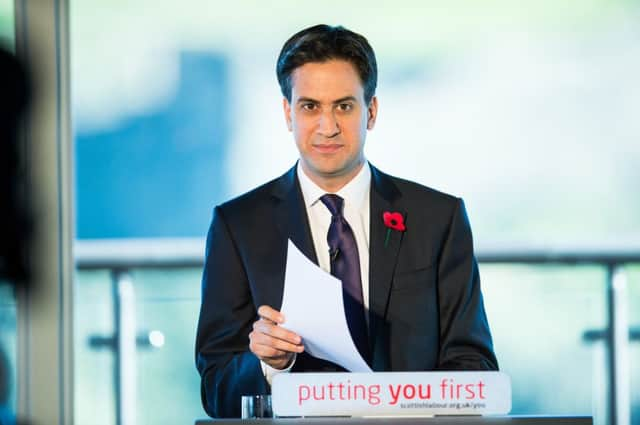Euan McColm: Miliband must show more PM potential


After Tony Blair took Labour to general election victory in 1997, the Conservatives responded by looking for comfort on the right wing, concerning themselves with matters of immigration and membership of the European Union. There followed years of misery – and three disastrous leaders – before the Tories decided that they disliked the prospect of terminal decline and put David Cameron in charge.
In the aftermath of Labour’s 2010 election defeat, the signs were that the party was retreating to its traditional (and I would suggest that traditional can so often simply mean out-of-date) left wing roots.
Advertisement
Hide AdAdvertisement
Hide AdThe election of Ed Miliband as successor to Gordon Brown pointed to a party still controlled by the unions, and their sometimes very “old” Labour leadership. Miliband was caricatured as “Red Ed” by opponents – in both politics and the media – and the muttering among party members was about the need to focus on the party’s mission of helping the most vulnerable in society.
The obvious flaw in these periods of entrenchment is that defeated parties move further away from voters. People do not vote Tory in a general election because the Labour Party of the day isn’t left wing enough. And nor do they back Labour on the grounds that Tories are too wet. But try telling that to someone after they’ve lost.
The sensible thing for any party suffering defeat to do is to assume not that voters rejected its candidates because they weren’t radical (in either direction) but that they choose the victors because they best captured the public mood and (at least appeared to) understand the issues that matter most to most of us.
Miliband shows signs that he understands this better than many politicians who find themselves charged with rousing a party laid low by the loss of power.
His speech at the University of London on Friday in which he laid into the “big five” banks – HSBC, Barclays, RBS, Santander, and Lloyds – was pitched at the middle-class voters who, for all activists’ might talk about concentrating their efforts on assisting the most vulnerable, are absolutely crucial if Labour is to have a chance of 2015 election victory.
Miliband said that a Labour government would create two “challenger” banks, which would mean greater competition and less power for those currently dominating the market. He said the banking sector had, for decades, been a poor servant of the real economy and that it should be serving the needs of small business. Miliband’s government would have the Competition and Markets Authority report on what a bank’s market share should be within six months of the May election, and the timetabled sell-off of branches should be completed five years later in 2020.
Miliband’s speech was heavily briefed which allowed the Tories to pre-empt his appearance at the university with an attack on previous Labour governments, blaming them for many of the problems that exist within the banking system.
But there was support from Lib Dem Business Secretary Vince Cable who, while suggesting Miliband was light on detail about his proposed new banks, agreed that there exists a need for more competition in the sector.
Advertisement
Hide AdAdvertisement
Hide AdMiliband’s speech spoke directly to the home-owning middle classes, to the folk who splurged 30 grand on a kitchen in 2007, believing the house would be worth 50 per cent more within a year or two, to the people who gambled with their own capital and lost.
Miliband said a reckoning with the banks was necessary for reform, rather than retribution. Of course, it’s about both. Miliband’s message was that his government would make the banks pay.
For all his flaws – and we will get to those – Miliband appears to recognise issues that resonate with voters. He used his party conference speech last September to promise a future Labour government would introduce a freeze on gas and electricity bills for homes and businesses for 20 months. That announcement played brilliantly with voters accustomed to ever increasing bills. It had broad appeal and would save most for those who pay most (and are most likely to vote).
So, Miliband has chosen his targets wisely. In both power companies and banks we have organisations that impact on just about everyone but cost most to what Miliband describes as the “squeezed middle”. But there are those flaws. Miliband remains an awkward performer. He lacks charisma and betrays little evidence of the sort of dynamism we like in our politicians. There is a hint of C3PO about the man.
Policies can only get a politician so far. There comes a point at which voters make that important judgment about whether a challenger would make a credible leader.
There remain doubts among many in his party that Miliband can pass that test.
Some colleagues fear that, in terms of candidates for prime minister, both parties are doing a decent job of re-enacting the 1992 general election when voters were faced with a choice between two men of limited appeal. That theory runs that the electorate returned Tory John Major because he couldn’t be as bad as Labour’s Neil Kinnock. The concern of some Labour activists and politicians is that if David Cameron simply does a better impression of being a leader than Miliband does then he wins again.
Simply saying the right things has never been enough. It matters, too, who is saying them. And Ed Miliband may have some way to go before convincing voters that his are the words of a prime minister-in-waiting.
Twitter: @euanmccolm